AI Agent Usage Survey: Over 90% of Companies Introducing AI Agents Have Experienced “Positive Changes in Their Work Styles.” The Emerging Importance of “AI Collaborative Skills” in the Workplace Also Highlighted
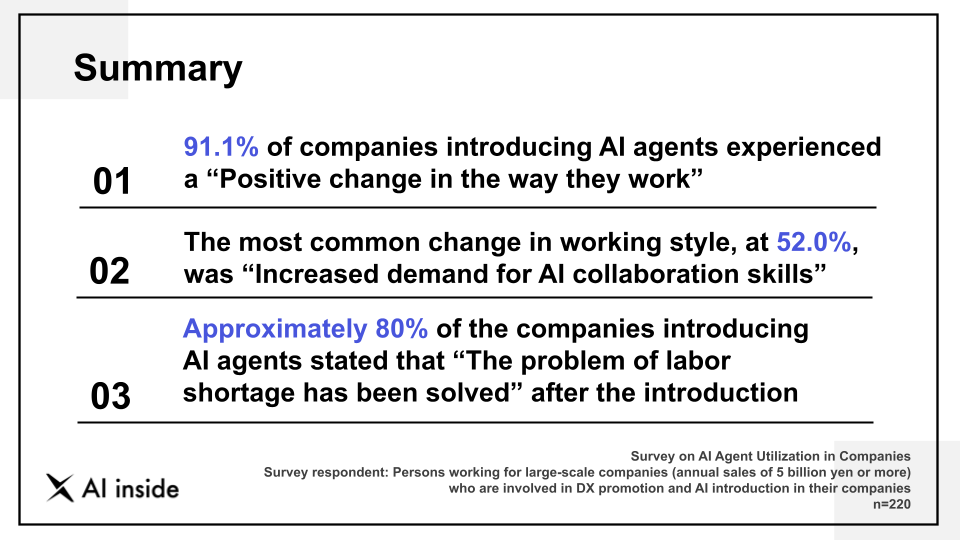
AI inside Inc., a provider of an AI platform, surveyed 220 people who work for large-scale companies with annual sales of 5 billion yen or more and who have been involved in DX promotion and AI introduction in their companies, regarding the AI agent utilization in companies.
Results
Summary
91.1% of the companies introducing AI agents have experienced a “Positive change in the way they work”
The most common change in working style, at 52.0%, was “Increased demand for AI collaboration skills”
Approximately 80% of the companies introducing AI agents stated that “The problem of labor shortage has been solved” after the introduction
Although positive views surround the use and introduction of AI agents, their actual implementation in operations remains limited among respondents.
When asked, “Q1. What is your company’s usage of AI agents in your business?” (n=220), 20.0% responded “At the stage of obtaining related information (with or without plans to introduce)” and 23.6% responded “Considering introduction (considering future use but have not yet introduced it).” Of those who have already introduced AI agents, 20.0% responded “Introducing on a trial basis (undergoing trials and proof testing in some departments and operations),” 15.0% responded “Introducing and utilizing them (however not yet actually implemented),” and 15.9% responded “Already in active use (as an established part of the business).”
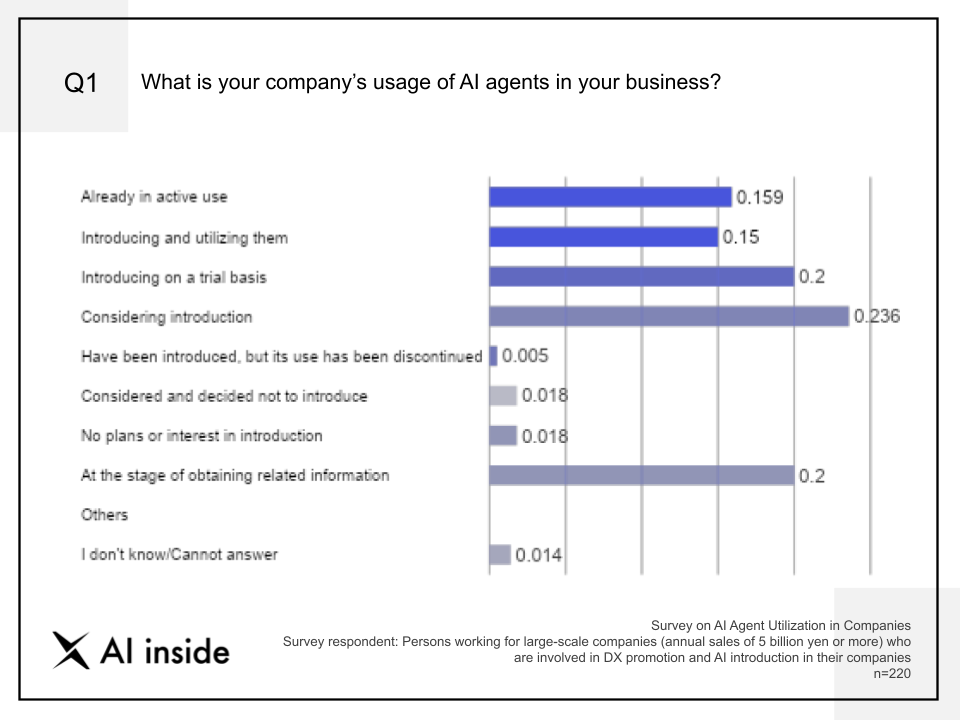
“Cost reduction” and “Improved accuracy of operations” were the top purposes of introducing AI agents
To those who responded that they are considering or have considered introducing AI agents in Q1, we asked, “Q2. What is the purpose of introducing AI agents to your company? (Multiple answers allowed)” (n=169). 54.4% responded “Cost reduction (to reduce labor and operating costs),” 47.9% responded “Improved accuracy of operations (reduce human errors and improve accuracy and quality),” and 42.0% responded “Automation and streamlining of operations (automate routine and simple tasks).”
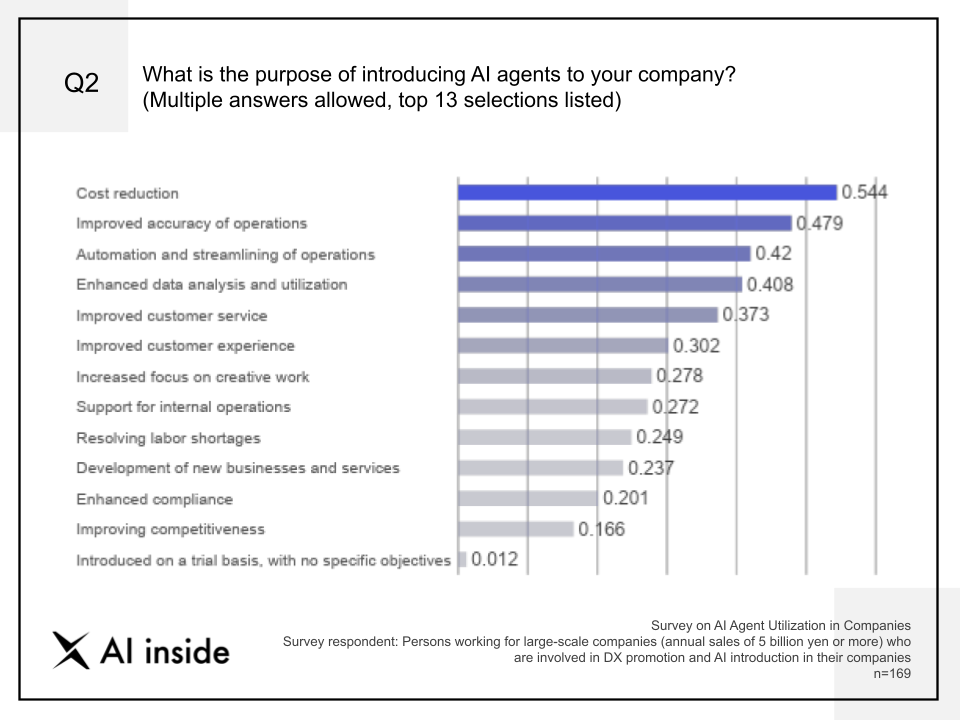
AI agents are used in “Documentation and report writing” and “Data entry and review” situations
To those who responded that they are considering or have already introduced AI agents in Q1, we asked, “Q3. In what situations do you use (or consider using) AI agents? (Multiple answers allowed)” (n=164). 53.0% responded “Documentation and report writing (Minute taking, summarizing, translating, and automatic recording),” 50.0% responded “Data entry and review (accounting tasks, invoice processing, and input error detection),” and 43.3% responded “Customer support (chatbots and automated response for inquiries).”
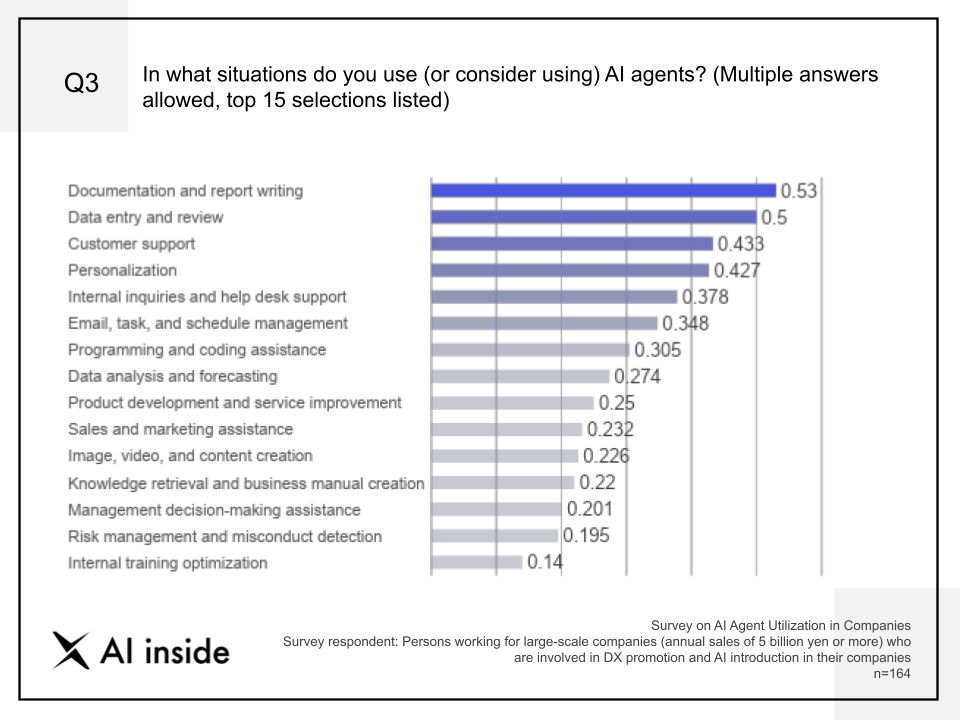
53.6% of companies introducing AI agents say they have observed “Reduction in labor and operation costs”
To those who responded that they have introduced AI agents in some form in Q1, we asked, “Q4. What effects have you seen from the introduction and use of AI agents? (Multiple answers allowed)” (n=112). 53.6% responded “Reduction in labor and operation costs,” 45.5% responded “Optimized resource allocation by improving operational efficiency,” and 42.9% responded “Fewer human errors and improved accuracy of operations.”
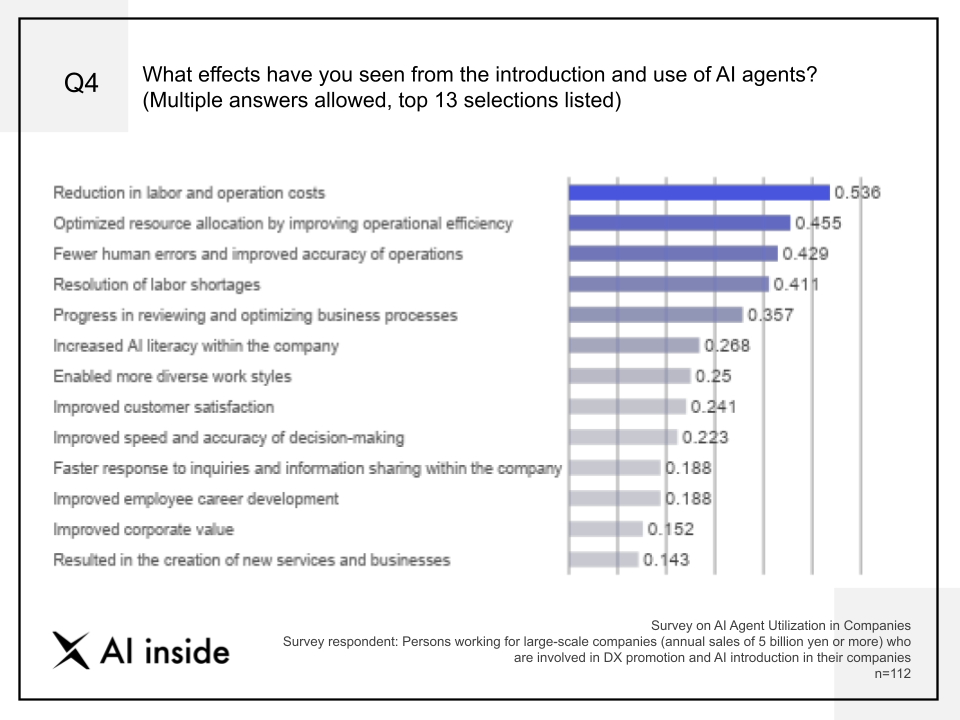
91.1% of companies introducing AI agents have observed a “Positive change in the way they work”
To those who responded that they have introduced AI agents in some form in Q1, we asked, “Q5. What changes have you seen in your work style since the introduction of AI agents?” (n=112). 38.4% responded “Very positive change” and 52.7% responded “Somewhat positive change.”
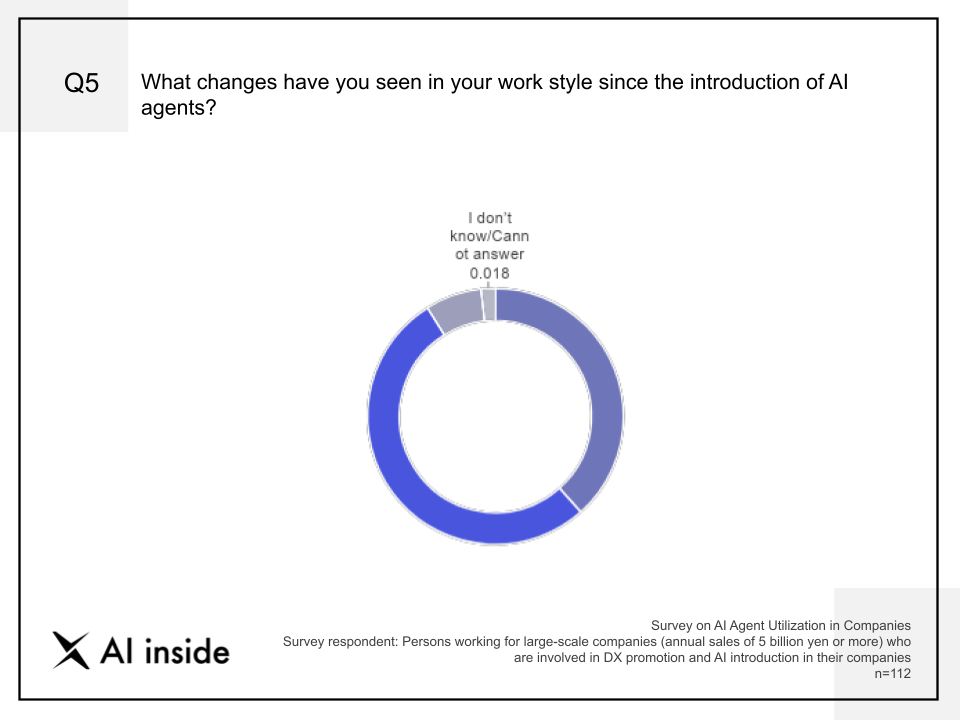
The most common change in work style was that “AI collaboration skills are now required”
To those who responded “Very positive change” and “Somewhat positive change” in Q5, we asked, “Q6. What positive changes have you seen in people’s work styles resulting from the introduction of AI agents? (Multiple answers allowed)” (n=102). 52.0% responded “AI collaboration skills (utilization and management of AI) are now required” and 45.1% responded “New work skills are now required.”

Approximately 80% of companies introducing AI agents say “The human resource shortage has been resolved”
To those who responded that they have introduced AI agents in some form in Q1, we asked, “Q7. How much has the human resource shortage been resolved after the introduction of the AI agents?” (n=112). 23.2% responded “Significantly resolved” and 55.3% responded “Somewhat resolved.”
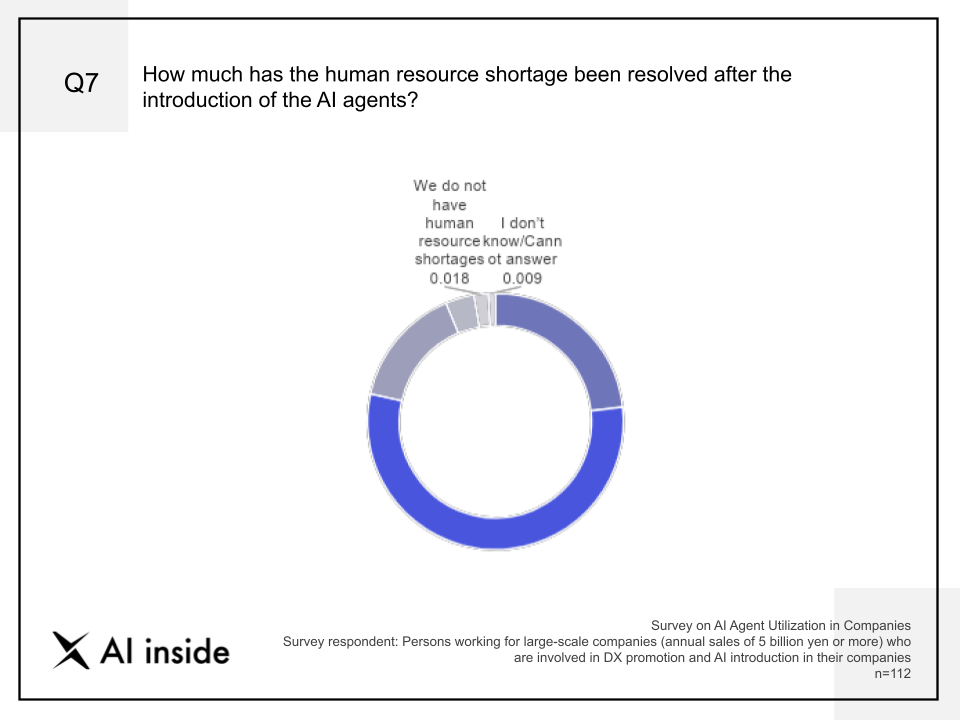
More than half of the respondents plan a “Change in recruitment targets” and “Creation of new specialized positions or jobs”
To those who responded that they are considering or have already introduced AI agents in Q1, we asked, “Q8. As a result of the introduction of AI agents, how do you plan to change (or consider changing) your future recruiting and human resource strategies? (Multiple answers allowed)” (n=164). 53.0% responded “Change in recruitment targets (e.g., setting skill requirements based on the use of AI),” 51.2% responded “Creation of new specialized positions or jobs (e.g., AI application promotion),” and 48.8% responded ”Retraining or skill shift of existing employees.”
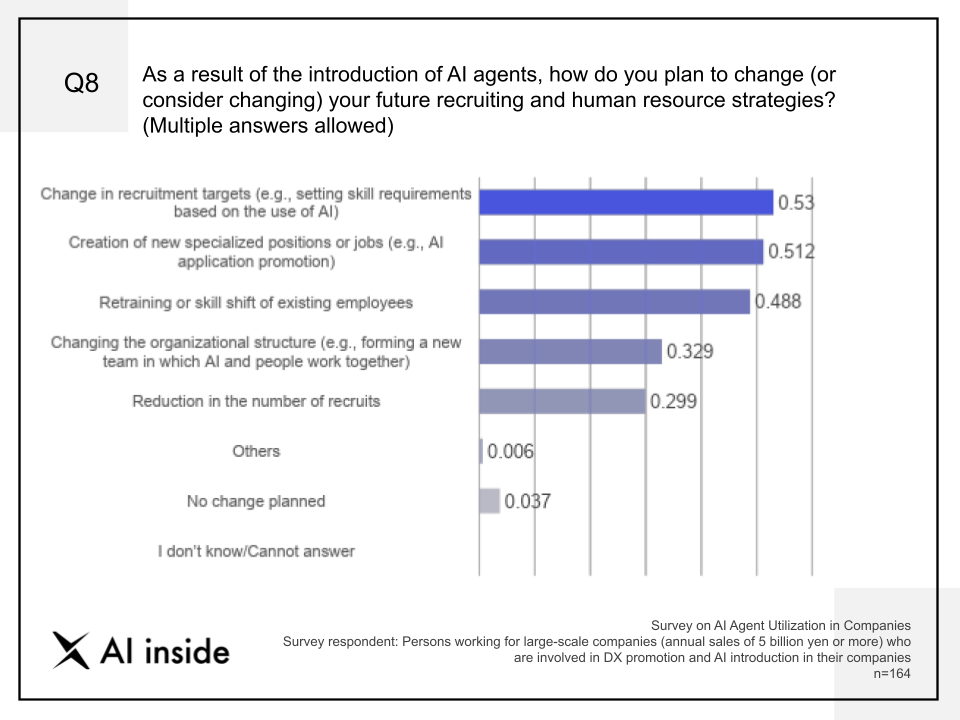
Conclusion
The emergence of generative AI has further accelerated the DX of companies, increasing expectations for AI agents to solve human resource shortages and improve work efficiency. This survey revealed through specific evidence that the introduction of AI agents has actually contributed to addressing human resource shortages and transforming their work practices.
Introduction of AI agents not only increases the need of AI utilization skills. We also see signs of change in human resource development policies, corporate human resource strategies, and organizational structures, implying the shift to an era in which AI collaborative skills are required.
As we anticipate the arrival of the AGI (Artificial General Intelligence) era, AI agents are poised to become central to the future of work, as they have the potential to exceed human intellectual capabilities, and their emergence represents a paradigm shift that will fundamentally reshape corporate management, work styles, and value creation. The key to sustainable growth will be our ability to coexist with AGI and how to effectively integrate its capabilities into business operations and organizational structures. Sustainable growth will be directly achieved through business design and human resource strategies developed in collaboration with AI.
The development of work environments and operational structures that leverage generative AI and AI agents is increasingly crucial for companies, as well as cultivating human resources capable of effectively utilizing these technologies. For individuals, future career success will depend on acquiring the necessary skills and knowledge to collaborate effectively with AI in value creation.
Realizing “Work with Buddy,” where human and AI work together
Based on the concept of “No More Tools, Work with Buddy,” AI inside advocates a next-generation work style where AI acts as a collaborative “Buddy” rather than a mere instrument. As a core product of this concept, “DX Suite” is evolving from an AI-OCR-driven business automation tool to an AI agent capable of comprehending user workflows and autonomously performing tasks. *1
Through such evolution, we will continue to support true transformation of companies toward the realization of “value shift,” in which time and funds created by streamlining and automating operations are used to shift to and invest in higher value-added operations. AI inside is committed to fostering future work styles where humans and AI collaborate as we move towards the AGI era.
*1 AI inside Loads “DX Suite” With an AI Agent, Realizing the “Work With Buddy” Concept
Survey overview
- Name of survey: Survey on AI Agent Utilization in Companies
- Survey method: Internet survey planned by Research PR “Research+P” provided by IDEATECH Inc.
- Survey period: March 14, 2025 to March 15, 2024
- No. of valid responses: 220 persons working for large-scale companies (annual sales of 5 billion yen or more) who are involved in DX promotion and AI introduction in their companies
*Composition ratios are rounded to the first decimal place; therefore, totals do not necessarily add up to 100.
Conditions of use of this survey data
Indicate the company name “AI inside” as the source of the information.
Provide the following link as the source of the information when using the data on your website.
URL: https://inside.ai/en/news/2025/0423_aiagent-trend-1
About AI inside Inc.
AI inside is a tech company that conducts R&D and social implementation of generative AI, LLM, and autonomous AI. We have internally developed “PolySphere-2,” an LLM specialized for Japanese document processing, and we are building an AI infrastructure to enable the use of generative AI specialized for the organizations and operations of each company through the “Customized SLM” that is trained by company-owned data. We also develop and provide the generative AI agent “Heylix,” “DX Suite,” which utilizes AI-OCR to structure unstructured data in forms, and the supporting AI infrastructures “AnyData” and “AI inside Cube,” which have been used by approximately 3,000 companies and 60,000 users, including government agencies, local governments, and private companies.
https://inside.ai/en/
*The service names appearing on this site are trademarks or registered trademarks of AI inside.
| Contact for Press Inquiries AI inside Inc. Public Relations Unit TEL: +81-3-5468-5041 E-mail: pr@inside.ai |
